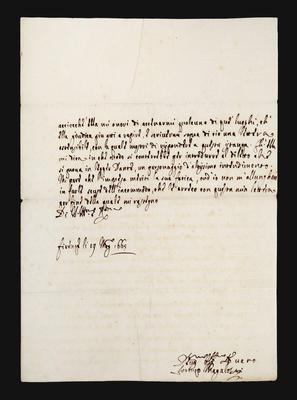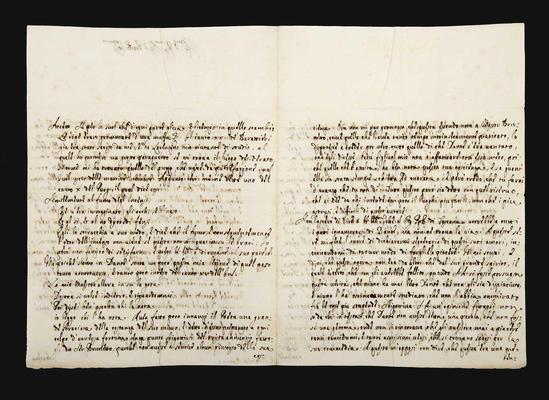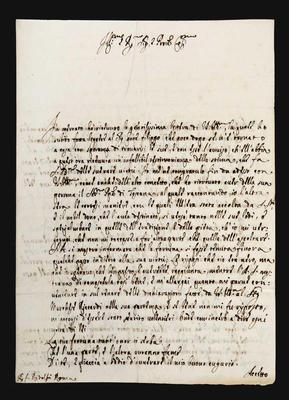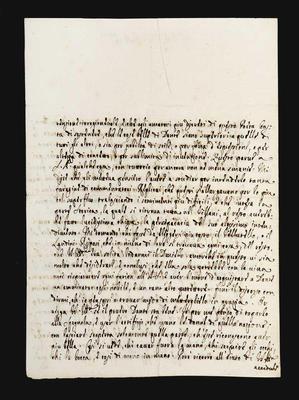Lorenzo Magalotti
Signed autograph letter to Francesco Ridolfi, on the Commedia and its commentators.
Florence, 19 May 1665.Two paper leaves folded (268x191 mm). 96 lines on five pages, fols. 3v and 4r blanks. Address panel on the lower margin of the recto of the first leaf, ‘Sig. F. Ridolfi Roma', in Magalotti's own hand. On fol. 4v the note ‘Sr. Lorenzo Magalotti Firenze 19 Maggio 1665.', in a seventeenth-century hand.
Provenance: Livio Ambrogio collection.
An unpublished letter written in 1665 by the Florentine scientist, poet, diplomat and secretary of the Accademia del Cimento Lorenzo Magalotti, which documents his great interest in Dante's poetry. In the same year Magalotti had undertaken the composition of a commentary upon the Commedia, which was never completed; it finishes after Cantov of the Inferno, and was published only in 1819.
The addressee was his friend and mentor Francesco Ridolfi, a member of the Accademia della Crusca who was at the time resident in Rome. Ridolfi, together with the Roman scholar Ottavio Falconieri, encouraged Magalotti's Dante project, discussing with him many points of detail in a series of letters only partly published in the collection of Magalotti's Lettere familiari (1769). In the present letter Magalotti discusses the possible interpretation of some verses from the Purgatorio, and also mentions the cardinal Leopoldo de' Medici's desire to read the Commedia, “il Sig. Principe di Toscana vorrebbe a tutti i patti innamorarsi di Dante, ma non ne trova la via”. Magalotti asks for Ridolfi's advice on the best way to introduce this leading figure at the Florentine court and “un tant'alto protettore” – Leopoldo de' Medici had founded in 1657 the Accademia del Cimento and was also Magalotti's patron – to the pleasure of reading Dante, perhaps with a commentary to guide him, which would provide clear explanations of the most difficult passages: in “tanta faragine di commentatori” Magalotti refers to the well-known commentaries on the Commedia composed by Cristoforo Landino, Alessandro Vellutello, and Bernardino Daniello. This request occasioned a famous reply from Ridolfi – included in the Lettere familiari – in which he surveys the exegetical tradition on the Commedia. According to Ridolfi none of the early commentators can be considered perfect or exhaustive: “l'ottimo però interprete è Dante a se medesimo” (i.e. “the best interpreter of Dante is Dante himself”). This hitherto unrecorded letter thus sheds important new light on the continuing interest in Dante in seventeenth-century Florentine culture, notwithstanding the relative absence of printed editions of the poem during this century (only three were published and none in Florence).





